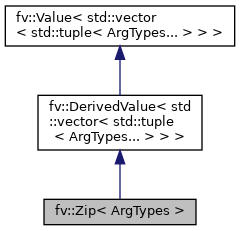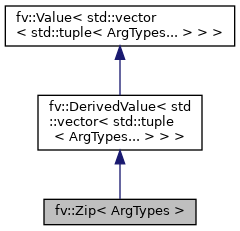Zips a series of vectors together. More...
#include <value.hpp>
Inheritance diagram for fv::Zip< ArgTypes >:

Collaboration diagram for fv::Zip< ArgTypes >:

Public Member Functions | |
| Zip (Value< std::vector< ArgTypes >> *... args, const std::string &alias) | |
 Public Member Functions inherited from fv::DerivedValue< std::vector< std::tuple< ArgTypes... > > > Public Member Functions inherited from fv::DerivedValue< std::vector< std::tuple< ArgTypes... > > > | |
| DerivedValue (const std::string &name, const std::string &alias="") | |
| std::vector< std::tuple< ArgTypes... > > & | get_value () |
| Calculate, if necessary, and return the value held by this object. | |
 Public Member Functions inherited from fv::Value< std::vector< std::tuple< ArgTypes... > > > Public Member Functions inherited from fv::Value< std::vector< std::tuple< ArgTypes... > > > | |
| Value (const std::string &name, const std::string &alias="") | |
Protected Member Functions | |
| void | update_value () |
| Updates the internal value. More... | |
| std::string | _get_name () |
Additional Inherited Members | |
 Protected Attributes inherited from fv::DerivedValue< std::vector< std::tuple< ArgTypes... > > > Protected Attributes inherited from fv::DerivedValue< std::vector< std::tuple< ArgTypes... > > > | |
| std::vector< std::tuple< ArgTypes... > > | value |
| bool | value_valid |
Detailed Description
template<typename... ArgTypes>
class fv::Zip< ArgTypes >
Zips a series of vectors together.
Can be combined with Map to yield a Value whose elements are individually a function of the corresponding elements of the vectors that were zipped together. For those familiar with python, it accompilishes the same thing as
xs = [1,2,3,4]
ys = [10,20,30,40]
print(list(map(lambda t:t[0]+t[1],zip(xs,ys))))
which outputs
[11, 22, 33, 44]
Member Function Documentation
◆ update_value()
template<typename... ArgTypes>
|
inlineprotectedvirtual |
Updates the internal value.
This function should be overridden by any child class to do the actual work of updating value based on whatever rules the class chooses. Normally, this consists of geting the values from some associated Value objects, doing some calculation on them, and storing the result in value.
Implements fv::DerivedValue< std::vector< std::tuple< ArgTypes... > > >.
The documentation for this class was generated from the following file:
- /home/caleb/Sources/TTTT/filval/value.hpp
 1.8.13
1.8.13